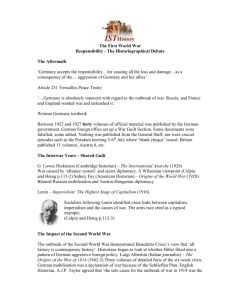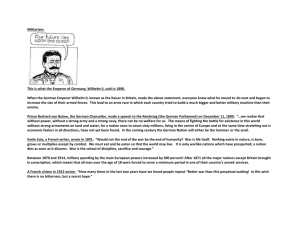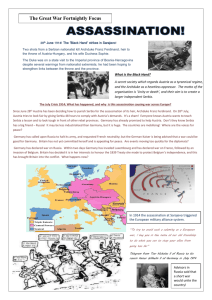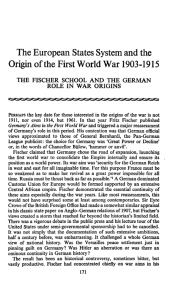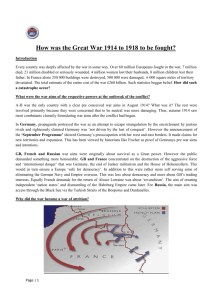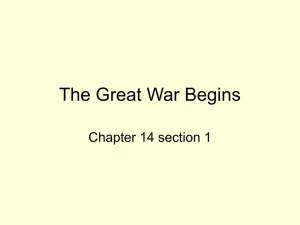Who was most responsible for the outbreak of WWI
advertisement
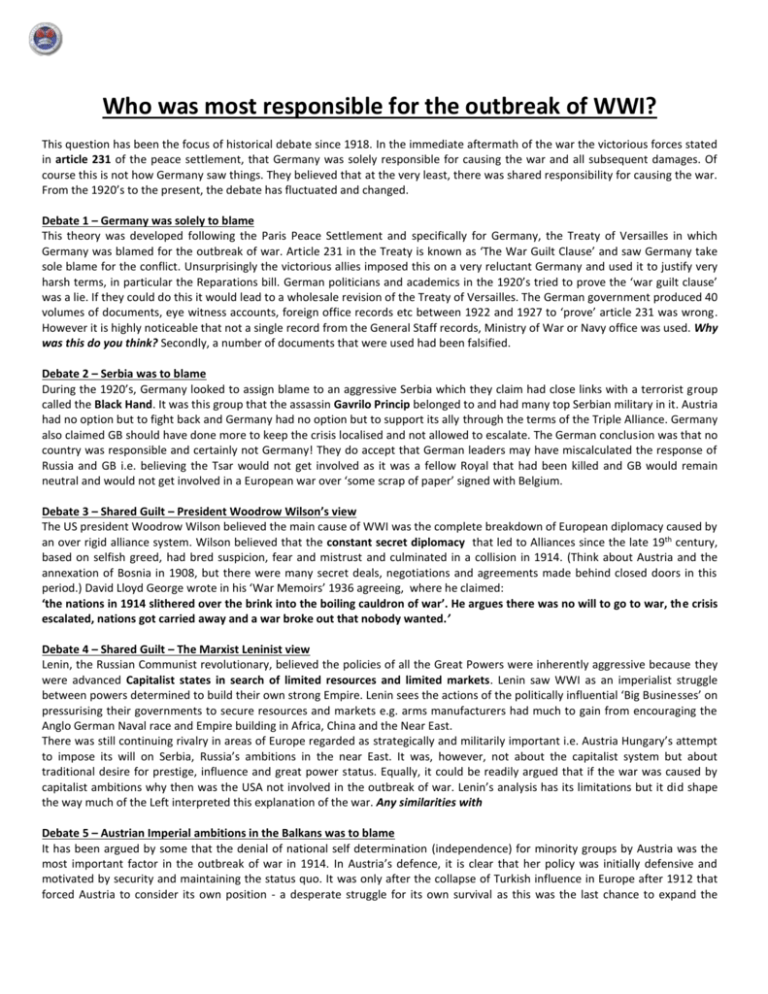
Who was most responsible for the outbreak of WWI? This question has been the focus of historical debate since 1918. In the immediate aftermath of the war the victorious forces stated in article 231 of the peace settlement, that Germany was solely responsible for causing the war and all subsequent damages. Of course this is not how Germany saw things. They believed that at the very least, there was shared responsibility for causing the war. From the 1920’s to the present, the debate has fluctuated and changed. Debate 1 – Germany was solely to blame This theory was developed following the Paris Peace Settlement and specifically for Germany, the Treaty of Versailles in which Germany was blamed for the outbreak of war. Article 231 in the Treaty is known as ‘The War Guilt Clause’ and saw Germany take sole blame for the conflict. Unsurprisingly the victorious allies imposed this on a very reluctant Germany and used it to justify very harsh terms, in particular the Reparations bill. German politicians and academics in the 1920’s tried to prove the ‘war guilt clause’ was a lie. If they could do this it would lead to a wholesale revision of the Treaty of Versailles. The German government produced 40 volumes of documents, eye witness accounts, foreign office records etc between 1922 and 1927 to ‘prove’ article 231 was wrong. However it is highly noticeable that not a single record from the General Staff records, Ministry of War or Navy office was used. Why was this do you think? Secondly, a number of documents that were used had been falsified. Debate 2 – Serbia was to blame During the 1920’s, Germany looked to assign blame to an aggressive Serbia which they claim had close links with a terrorist group called the Black Hand. It was this group that the assassin Gavrilo Princip belonged to and had many top Serbian military in it. Austria had no option but to fight back and Germany had no option but to support its ally through the terms of the Triple Alliance. Germany also claimed GB should have done more to keep the crisis localised and not allowed to escalate. The German conclusion was that no country was responsible and certainly not Germany! They do accept that German leaders may have miscalculated the response of Russia and GB i.e. believing the Tsar would not get involved as it was a fellow Royal that had been killed and GB would remain neutral and would not get involved in a European war over ‘some scrap of paper’ signed with Belgium. Debate 3 – Shared Guilt – President Woodrow Wilson’s view The US president Woodrow Wilson believed the main cause of WWI was the complete breakdown of European diplomacy caused by an over rigid alliance system. Wilson believed that the constant secret diplomacy that led to Alliances since the late 19th century, based on selfish greed, had bred suspicion, fear and mistrust and culminated in a collision in 1914. (Think about Austria and the annexation of Bosnia in 1908, but there were many secret deals, negotiations and agreements made behind closed doors in this period.) David Lloyd George wrote in his ‘War Memoirs’ 1936 agreeing, where he claimed: ‘the nations in 1914 slithered over the brink into the boiling cauldron of war’. He argues there was no will to go to war, the crisis escalated, nations got carried away and a war broke out that nobody wanted.’ Debate 4 – Shared Guilt – The Marxist Leninist view Lenin, the Russian Communist revolutionary, believed the policies of all the Great Powers were inherently aggressive because they were advanced Capitalist states in search of limited resources and limited markets. Lenin saw WWI as an imperialist struggle between powers determined to build their own strong Empire. Lenin sees the actions of the politically influential ‘Big Businesses’ on pressurising their governments to secure resources and markets e.g. arms manufacturers had much to gain from encouraging the Anglo German Naval race and Empire building in Africa, China and the Near East. There was still continuing rivalry in areas of Europe regarded as strategically and militarily important i.e. Austria Hungary’s attempt to impose its will on Serbia, Russia’s ambitions in the near East. It was, however, not about the capitalist system but about traditional desire for prestige, influence and great power status. Equally, it could be readily argued that if the war was caused by capitalist ambitions why then was the USA not involved in the outbreak of war. Lenin’s analysis has its limitations but it did shape the way much of the Left interpreted this explanation of the war. Any similarities with Debate 5 – Austrian Imperial ambitions in the Balkans was to blame It has been argued by some that the denial of national self determination (independence) for minority groups by Austria was the most important factor in the outbreak of war in 1914. In Austria’s defence, it is clear that her policy was initially defensive and motivated by security and maintaining the status quo. It was only after the collapse of Turkish influence in Europe after 1912 that forced Austria to consider its own position - a desperate struggle for its own survival as this was the last chance to expand the weakened Austro-Hungarian Empire. The vacuum left by Turkey brought Russia and Austria Hungary into conflict as each viewed the other as a threat to their Great Power status. After the Balkan wars 1912/1913, war seemed inevitable and a peaceful solution impossible to achieve. It is Austria’s treatment of Serbia however, that is condemned the most by critics as both reckless and aggressive – almost an act of suicide knowing that a conflict with Serbia was bound to bring Russia in and probably other powers. However, it should also be noted that Germany’s decision to give Austria Hungary a ‘Blank Cheque’ (guarantee of support should conflict arise) on July 5th 1914 emboldened her to go to war against Serbia. Without Germany’s willing support it is possible that the war would have been short lived and localised at worst. Debate 6 - The Fischer controversy – Germany was mainly to blame. Fritz Fischer’s work in 1966 caused a sensation particularly in his native West Germany. He levelled responsibility for the Great War squarely at the door of Germany. He argues that the govt hoped for a major European war in 1914 and the reason for it was the social, economic and political domestic situation on the eve of war. The reason why such an analysis emerged was the access to the imperial archives which previous historians had not had. The controversy emerges because of the responsibility he places on the shoulders of the civilian politicians. In previous analysis they were seen to have been led and misled by the generals. Fischer’s argument states that they shared the same objectives and approach. Why do you think the West German government and the historical community were so damning and critical of Fischer? The govt cancelled funding for his research and proposed lecture tour of the USA. However Fischer hit back and, with the help of a former student called Immanuel Geiss, unveiled documentary evidence that forced his critics to listen. They began to grudgingly accept that German strategy had been highly risky. However they also argue that it was justified because of the scale and pace of Russian military build up. Thus the risk of war was purely a defensive one and not, as Fischer argues, an offensive one - not to achieve aggressive objectives but to secure Germany’s position as a Great Power. Fischer published a second thesis 3 years later in 1969. He provided extensive documentary evidence that proved there was a strong will to war among German leaders long before 1914. Fischer drew particular attention to the diary entry of Admiral Muller. It detailed a meeting in Dec 1912 between the Kaiser and his military advisers. A memo from his ambassador in London which stated that GB was prepared to support France if attacked by Germany. This memo prompted a general review of the European situation. Moltke, the Chief of General Staff, claimed ‘war was inevitable and the sooner the better!’ Fischer argues this ‘war council’ meeting proved Germany’s intention was to wage war in Europe at the earliest opportunity. Fischer finishes his argument by emphasising the incredible pressure and influence of the autocratic, militaristic Junker (aristocracy) who were violently anti democratic and anti modern. They wished to stop the forces of social democracy in Germany and to reassert themselves on the German people. What better way than some glorious military victory to rally the people’s nationalistic fervour........ Fischer’s work has been reinforced by later historians of the 1970’s and 1980’s – Herwig portrays the German ruling elite as ‘ridden with anxiety, paranoia, fear and guilt as well as dominated by a remarkable egoism. The publication of the diaries of Kurt Riezler in 1973 further substantiated this point. He had been the closest adviser to the Chancellor Bethmann-Hollwegg and showed the dangerous high risk strategy of 1914. A question mark remains however over whether it was because of long nurtured aggressive designs or because of defensive motives. British historians like Norman Stone and James Joll also advocate the Fischer line that by ‘Dec 1912, German rulers had accepted that war was inevitable’. In addition to Fischer’s work about German planning for war, there has been meticulous research of the Russian and French position suggesting neither wanted a war in 1914. GB also wanted to avoid conflict but did not know how best to achieve it. It is possible that if GB had been more categorical in their defence of their Entente allies it would have put Germany off and made them rethink policy. As it was, the war that broke out was a result of a fateful meshing of German Weltpolitik with irresponsible Austrian Balkanpolitik. In conclusion, research and evidence all seems to point to the fact that Germany and Austria started the war and dragged the rest of the powers into it.
